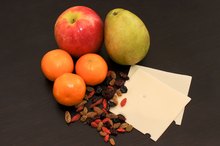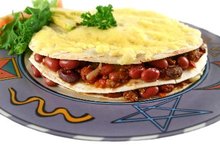Good Carbs to Eat for Breakfast
Taking the time to eat a balanced breakfast can have significant payoffs, since eating breakfast can help you control your weight and improve your nutrient intake. A balanced breakfast with nutrient-dense sources of carbohydrates can be easy to prepare and provide lasting energy for the morning.
Whole Grains
Whole grains contain the gram, germ and endosperm component of the entire grain kernel, while refined grains include only the starchy endosperm. Choosing whole grain products instead of refined grains can help you control your weight and lower your risk for heart disease and type 2 diabetes. A 2013 research study in the Journal of Epidemiology noted that high-carbohydrate intake from mainly refined grains was associated with an increased risk for heart disease.
Sources of Whole Grains
How to Lose Weight While on Beta Blockers
Learn More
Oatmeal, whole-grain breakfast cereal, whole-wheat toast, bagels, or English muffins and whole-grain waffles are natural sources of dietary fiber, B vitamins and iron. Select fortified whole grains to increase your consumption of iron and folic acid. For breakfast, try a bagel with peanut butter and pear slices, cereal with reduced-fat milk and strawberries or egg whites on whole-grain toast. Whole-grain wraps are portable options. Remember to choose unsweetened cereal and other grain products instead of products that contain large amounts of added sugars which just add extra unneeded carbohydrates.
Fruit
Most fruit is fat-free and a source of carbohydrates as well as dietary fiber, potassium and antioxidants. Add fresh or frozen berries to cereal or oatmeal, eat some grapefruit or an orange with a whole-grain bagel or have melon with ham and whole-wheat toast. Grapes, apples, oranges and bananas are portable fruits that you can take to work in the morning. Pair them with a container of fat-free yogurt or a small bag of whole-grain cereal.
Dairy Products
Can Eating 30 Grams of Protein Each Morning Help You Lose Weight?
Learn More
Milk is a natural source of lactose, which is a type of simple carbohydrate. Fat-free milk and yogurt are also sources of high-quality protein -- which helps keep you full -- and of calcium, which is essential for building and maintaining strong bones. Oatmeal with milk, almonds and diced apple, cereal with yogurt and whole-grain waffles with yogurt and vegetarian breakfast sausage are ideas for balanced breakfasts with dairy products. Reduced-fat cheese is lower in carbohydrates than milk and yogurt, but it is a good source of protein and calcium.
Beans
Beans count as vegetables and protein foods. They are low-glycemic because consuming them does not cause unhealthy spikes in your blood sugar levels. A breakfast burrito with pinto beans, reduced-fat cheddar cheese, tomatoes and lettuce on a whole-grain tortilla is a nutritious, high-carbohydrate breakfast. Other ideas for having legumes for breakfast include a black bean burger on a high-fiber bun, and an egg scramble with black beans, zucchini and bell peppers.
Related Articles
References
- USDA and US Department of Health and Human Services: Dietary Guidelines for Americans, 2010
- Linus Pauling Institute: Legumes
- Linus Pauling Institute: Whole Grains
- American Journal of Epidemiology: Dietary Carbohydrates, Refined Grains, Glycemic Load, and Risk of Coronary Heart Disease in Chinese Adults
Writer Bio
Natalie Stein specializes in weight loss and sports nutrition. She is based in Los Angeles and is an assistant professor with the Program for Public Health at Michigan State University. Stein holds a master of science degree in nutrition and a master of public health degree from Michigan State University.









